Articles
- Page Path
- HOME > Korean J Community Nutr > Volume 20(2); 2015 > Article
-
Research Article
- Survey on Health-related Factors, Nutrition Knowledge and Food Habits of College Students in Wonju Area
- Seung Lim Lee, Sun Hee Lee
-
Korean Journal of Community Nutrition 2015;20(2):96-108.
DOI: https://doi.org/10.5720/kjcn.2015.20.2.96
Published online: April 30, 2015
1Department of Food Nutrition and Cooking, Sangji Youngseo College, Wonju, Korea.
2Department of Food and Nutrition, Suwon Women's University, Suwon, Korea.
- Corresponding author: Sun Hee Lee. Department of Food & Nutrition, Suwon Women's University, 1098, Juseok Street, Bongdameup, Hwaseong, Gyeonggi-do 445-890, Korea. Tel: (031) 290-8947, Fax: (031) 290-8924, a54759768@swc.ac.kr
Copyright © 2015 The Korean Society of Community Nutrition
This is an Open-Access article distributed under the terms of the Creative Commons Attribution Non-Commercial License (http://creativecommons.org/licenses/by-nc/3.0/) which permits unrestricted non-commercial use, distribution, and reproduction in any medium, provided the original work is properly cited.
- 1,702 Views
- 8 Download
- 23 Crossref
Abstract
-
Objectives
- This study was performed to investigate health-related factors, nutrition knowledge and food habits of college students in Wonju.
-
Methods
- A total of 442 (male: 221, female: 221) college students were recruited and a questionnaire-based survey was conducted. The general characteristics, health-related factors, nutrition knowledge, and food habits were investigated and data were analyzed using SPSS WIN (ver 21.0).
-
Results
- The body mass index (22.9 kg/m2 vs 20.9 kg/m2, p < 0.001) was significantly higher in the males. The ratio of weight (p < 0.001) was significantly different between males and females. Health-related factor scores 'Exercise (p < 0.001)', 'Number of exercise (p < 0.001)', 'Times of exercise (p < 0.01)', 'Concerns about health (p < 0.05)', 'Health condition (p < 0.001)' were significantly higher in the males. 'Type of exercise (p < 0.001)' was significantly different between males and females. Score on 'Watching TV & computer games (p < 0.01)' was significantly higher in the females. Smoking (p < 0.001) was significantly higher in the males. Type of beverages consumed (p < 0.001) was significantly different between males and females. Nutrition knowledge score (11.8 vs 12.9, p < 0.05) was significantly higher in the females. Scores on 'Iron deficiency is leading to anemia (p < 0.01)' and 'carbonated beverages, such as coke, have no calorie (p < 0.05)' were significantly higher in the females. Food habits score (56.4 vs 53.7, p < 0.01) was significantly higher in the males. Scores on 'I have three meals a day (p < 0.01)', 'I have breakfast regularly (p < 0.001)', 'I have meals on time (p < 0.001)', 'I do exercise every day (p < 0.001)', 'I don't eat junk food often (p < 0.05)', 'I don't eat sweet food often (p < 0.05)', and 'I don't eat out often (p < 0.05)' were significantly higher in the males.
-
Conclusions
- Nutritional education for college students is needed in order to improve their health and nutritional education program should be tailored to meet various needs of these students.
- 1. Abood DA, Black DR, Birnbaum RD. Nutrition education intervention for college female athletes. J Nutr Educ Behav 2004; 36(3): 135-139.ArticlePubMed
- 2. Brown LB, Dresen RK, Eggett DL. College students can benefit by participating in a prepaid meal plan. J Am Diet Assoc 2005; 105(3): 445-448.ArticlePubMed
- 3. Chang HS, Kim MR. A study on the anthropometry and healh-related lifestyle habits of women college students in Kunsan. Korean J Community Nutr 2003; 8(4): 526-537.
- 4. Cheong SH, Chang KJ. Anthropometric measurement, dietary behavior and nutrient intake of the nation-wide college students attending a nutrition education via internet. J Korean Soc Food Sci Nutr 2006; 35(5): 565-571.Article
- 5. Cheong SH, Kwon WJ, Chang KJ. A comparative study on the dietary attitudes, dietary behaviors and diet qualities of food and nutrition major and non-major female university students. Korean J Community Nutr 2002; 7(3): 293-303.
- 6. Chung HA. Effects of nutrition related courses on nutrition knowledge and dietary attitudes of university students in Gyeongnam. Kyungnam University; 2009; 4-50 MS thesis.
- 7. Guo JL, Kim SK, Kim JW, Kim MH, Kim SN, Kim SB. Effects of nutrition education for Chinese college students in Korea - Focused on personalized daily energy requirement and food exchange units -. Korean J Community Nutr 2013; 18(6): 565-576.Article
- 8. Ha EJ, Caine-Bish N. Effect of nutrition intervention using a general nutrition course for promoting fruit and vegetable consumption among college students. J Nutr Educ Behav 2009; 41(2): 103-109.ArticlePubMed
- 9. Hwang JH, Lee HM. A study on lifestyles, dietary habits, nutrition knowledge and dietary behaviors of male university students according to residence type. Korean J Community Nutr 2007; 12(4): 381-395.
- 10. Jin YH, You KH. A study on the eating habit and eating out behavior of the university students in the Gyeonggi area. Korean J Community Nutr 2010; 15(5): 687-693.
- 11. Kang HJ, Byun KW. Effect of two-year course of food and nutrition on improving nutrition knowledge, dietary attitudes and food habits of junior college female students. Korean J Community Nutr 2010; 15(6): 750-759.
- 12. Kim BR. A study on nutrition knowledge, dietary habits, health-related life style and health condition of college students in Chuncheon. J Korean Soc Food Sci Nutr 2006; 35(9): 1215-1223.Article
- 13. Kim HK, Kim JH, Jung HK. A comparison of health related habits, nutrition knowledge, dietary habits, and blood composition according to gender and weight status of college students in Ulsan. Korean J Nutr 2012; 45(4): 336-346.Article
- 14. Kim KH. A Study of the dietary habits, the nutritional knowledge and the consumption patterns of convenience foods of university students in the Gwangju area. Korean J Community Nutr 2003; 8(2): 181-191.
- 15. Kim IS, Yu HH, Han HS. Effects of nutrition knowledge, dietary attitude, dietary habits and life style on the health of college students in the Chungnam area. Korean J Community Nutr 2002; 7(1): 45-57.
- 16. Kim MH, Jeong ES, Kim EJ, Chol HK, Bae YJ, Choi MK. Night eating status of university students in partial area of Chungnam. J East Asian Soc Diet Life 2011; 21(4): 563-576.
- 17. Kim YR. The relationship among types of leisure activity, subjective health status and the happy life. Korean J Sport Sci 2009; 20(3): 553-566.Article
- 18. Ko MS. The comparison in daily intake of nutrients and dietary habits of college students in Busan. Korean J Community Nutr 2007; 12(3): 259-271.
- 19. Healthy drinking club. Korea Public Health Associantion; 2015; cited March 20, 2015]. Available from http://kpha.intzvill.co.kr/club/sub/intro.php?p_mbs=02-01-01.
- 20. Korean Society for the Study of Obesity. Guideline for treatment of obesity. Cheongun, Seoul: 2012. p. 17-21.
- 21. Kwak HK, Lee MY, Kim MJ. Comparisons of body image perception, health related lifestyle and dietary behavior based on the self-rated health of university students in Seoul. Korean J Community Nutr 2011; 16(6): 672-682.Article
- 22. Lee JS, Kim GS. Factors on the seafood preference and eating frequency of the elementary school children. J Korean Soc Food Sci Nutr 2000; 29(6): 1162-1168.
- 23. Lee MS, Kwak CS. The comparison in daily intake of nutrients, quality of diets and dietary habits between male and female college students in Daejeon. Korean J Community Nutr 2006; 11(1): 39-51.
- 24. Lee SL. Effect of nutrition education on improving dietary attitudes, food habits and food frequency - Female in twenties shift work in Gyeonggi area. Korean J Community Nutr 2013; 18(1): 55-64.Article
- 25. Lee Y, Cho WK, Oh YJ. Comparison of eating behavior between commensality and solo-eating of university students by BMI. Korean J Community Nutr 2012; 17(3): 280-289.Article
- 26. Park HO, Hyun HJ, Song KH. The nutrition knowledge, attitudes, and dietary habits of physical education majors and non-majors of male college students. Korean J Community Nutr 2009; 14(4): 363-373.
- 27. Park MS, Kim SA. Effect of nutrition education on improving diet behavior of university students. Korean J Community Nutr 2005; 10(2): 189-195.
- 28. Guidelines for applicants. Republic of Korea army headquarters; 2015; cited April 18, 2015]. Available from http://www.goarmy.mil.kr/sub_noncom/sub_recruit3_5.jsp.
- 29. Seo EH. A study on food habits and nutrient intakes according to BMI in food and nutrition major and non-major female students in Kyungnam university. Korean J Community Nutr 2014; 19(4): 297-316.Article
- 30. Korea's society index, 2014. Statistics Korea; 2015; cited March 19, 2015]. Available from http://kostat.go.kr/portal/korea/kor_nw/2/6/1/index.board?bmode=read&bSeq=217&aSeq=334501&pageNo=1&rowNum=10&navCount=10&currPg=&sTarget=title&sTxt=.
- 31. The Ministry of Health and Welfare [MOHW]. Korea Centers for Disease Control and Prevention [KCDCP]. Korea National Health and Nutrition Examination Survey (KNHANES VI-1). Seoul: The Ministry of Health and Welfare Division of Health Policy; 2014. p. 2-113.
- 32. Winkleby MA, Cubbin C. Changing patterns in health behaviors and risk factors related to chronic diseases, 1990-2000. Am J Health Promot 2004; 19(1): 19-27.ArticlePubMedLink
- 33. Yeon JY, Hong SH, Bae YJ. A study on nutritional status and dietary quality of university students by body image. Korean J Community Nutr 2012; 17(5): 543-554.Article
- 34. You JS, Chin JH, Kim MJ, Chang KJ. College students' dietary behavior, health-related lifestyles and nutrient intake status by physical activity levels using International Physical Activity Questionnaire (IPAQ) in Incheon area. Korean J Nutr 2008; 41(8): 818-831.
REFERENCES
Figure & Data
REFERENCES
Citations

- Coffee Consumption Patterns According to Health Behavior and Dietary Factors among Young Adults : From the Korea National Health and Nutrition Examination Survey 2021
Hyun-Ju Jo, Hyun-Kyoung Bang
Journal of the East Asian Society of Dietary Life.2025; 35(4): 369. CrossRef - Which factor, food literacy or health promotion literacy, predicts women’s healthy eating habits better? Results of a study in western Iran
Serajeddin Mahmoudiani
Biodemography and Social Biology.2024; 69(4): 218. CrossRef - Usage and Quality Satisfaction of Convenience Food at Convenience Stores according to the Eating Behavior of University Students in Southern Gyeonggi Province
Se-In Oh, Ok-Sun Kim
Journal of the East Asian Society of Dietary Life.2023; 33(6): 492. CrossRef - Dietary habits and nutrient intake status of university students according to obesity risk based on body mass index and percent body fat
Chae Hong Lee, Kyung A Lee
Journal of Nutrition and Health.2023; 56(6): 714. CrossRef - Life stress, dietary attitudes, and frequency of snack intake for college students in Seoul and Gyeonggi area: the difference between male and female students
Hyun Seung Oh, Yu bin Kim, Soyoung Park, Kyunghee Song
Nutrition Research and Practice.2023; 17(1): 91. CrossRef - The Relationships between Food Literacy, Health Promotion Literacy and Healthy Eating Habits among Young Adults in South Korea
Yoojin Lee, Taehee Kim, Hyosun Jung
Foods.2022; 11(16): 2467. CrossRef - Use of Weight-control or Health Functional Foods, Associated Weight-control Behavior and Perception among University Students in Cheongju
Gayong Kim, Munkyong Pae
Korean Journal of Community Nutrition.2021; 26(1): 23. CrossRef - Analysis of Usage, Preference, and Satisfaction for Convenience
Store Dessert among University Students in Chungbuk Area
Go Eun Lee, Hye-In Yang, Yun-Jung Bae
Journal of Biotechnology and Bioindustry.2021; 9: 63. CrossRef - Nutrition Knowledge and Eating Behaviors among College Students in the Pyeongtaek Area
Seo Hyeon Ahn, Seong Yeong Kim
Journal of the East Asian Society of Dietary Life.2020; 30(3): 235. CrossRef - Sleep Quality and Its Association with the Dietary Behavior and Lifestyle of University Students in Cheongju
Sewhan Jin, Munkyong Pae
Korean Journal of Community Nutrition.2019; 24(5): 395. CrossRef - Development of a Lifelogs-Based Daily Wellness Score to Advance a Smart Wellness Service
Ki-Hun Kim, Kwang-Jae Kim, Chiehyeon Lim, Jun-Yeon Heo
Service Science.2018; 10(4): 408. CrossRef - Recognition and Propagation for Temple Food among University Students with Food-related Majors
In-Joon Huh, Sim-Yeol Lee
Korean Journal of Community Nutrition.2018; 23(2): 137. CrossRef - Lunch Eating Patterns and Dietary Habits of University Students according to Major Lunch Place
Hyunji Kim, Hongmie Lee
Journal of the Korean Dietetic Association.2016; 22(4): 261. CrossRef - Survey on Health Status and Food Habits of Male College Students in Wonju Area According to Drinking Behavior
Seung-Lim Lee
Journal of the Korean Dietetic Association.2016; 22(1): 41. CrossRef - A Study on Weight Control Behaviour, Eating Habits and Health-related Life Habits According to Obesity Degree of University Students in Jeonbuk
Hye-Soon Chang
Korean Journal of Human Ecology.2016; 25(1): 73. CrossRef - Dietary Habits and Perception Toward Food Additives according to the Frequency of Consumption of Convenience Food at Convenience Stores among University Students in Cheongju
Munkyong Pae
Korean Journal of Community Nutrition.2016; 21(2): 140. CrossRef - Studies on Dietary Habits and Residence Students’ Satisfaction with University Dormitory Foodservice in Jeollabuk-do Iksan Area
Kyung-Jin Min, Il-Sook Choi
Journal of The Korean Society of Food Culture.2016; 31(5): 442. CrossRef - Relationship between Eating Style and Food Intake of Healthy Female College Students during Chuseok Holidays
Seok-Young Kim
Korean Journal of Community Nutrition.2016; 21(2): 131. CrossRef - Dietary Habits, Dietary Behaviors, Depression and Stress according to Self-Rated Health of University Students in Kyungnam Province
Kyung-Ae Park
Journal of the Korean Dietetic Association.2016; 22(4): 272. CrossRef - Comparisons of Health Related Lifestyle and Dietary Behaviors according to Gender, Ethnicity and Residence Type of University Students in Yanbian, China
Kyung Hee Hong, Unju Hwa Oh
The Korean Journal of Food And Nutrition.2016; 29(4): 486. CrossRef - Health-related Factors, Nutrition Knowledge and Dietary Habits among Nursing and Allied Health College Students
Su Ol Kim
Journal of the Korean Society of School Health.2015; 28(3): 158. CrossRef - A Study on Sodium-related Dietary Attitude and Behaviors According to Sodium-related Nutrition Knowledge of University Students
Mi-Hyun Kim, Jee-Young Yeon, Jong Wook Kim, Jae-Eon Byun, So-Young Bu, Mi-Kyeong Choi, Yun-Jung Bae
Korean Journal of Community Nutrition.2015; 20(5): 327. CrossRef - Nutrition Knowledge, Food Habit Problems and Dietary Attitudes of Nursing Students
Su-Ol Kim, So-Myeong Kim
The Journal of Korean Academic Society of Nursing Education.2015; 21(4): 466. CrossRef
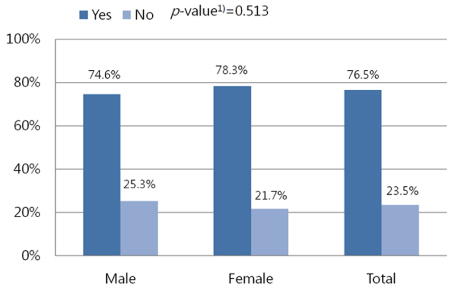
Fig. 1
The general characteristics of the subjects
1) Mean±SD
2) p-value by student's t-test, NS: not significant
3) N (%)
4) p-value by chi-square test, NS: not significant
Anthropometric data of the subjects
1) Mean±SD
2) p-value by student's t-test
3) N (%)
4) p-value by chi-square test
Health-related factors of the subjects
1) p-value by chi-square test, NS: not significant
2) N (%)
Smoking, alcohol and beverages intakes habits of the subjects
1) p-value by chi-square test, NS: not significant
2) N (%)
Mean nutrition knowledge score of the subjects
1) N (%)
2) p-value by chi-square test, NS: not significant
3) Correct answer was given one point. Higher score indicates having more nutrition knowledge, with a possible score of 0 - 20
4) Mean±SD
5) p-value by student's t-test, NS: not significant
Food habits of the subjects
1) p-value by student's t-test, NS: not significant
2) Mean±SD
1) Mean±SD 2) 3) N (%) 4)
1) Mean±SD 2) 3) N (%) 4)
1) 2) N (%)
1) 2) N (%)
1) N (%) 2) 3) Correct answer was given one point. Higher score indicates having more nutrition knowledge, with a possible score of 0 - 20 4) Mean±SD 5)
1) 2) Mean±SD

 KSCN
KSCN

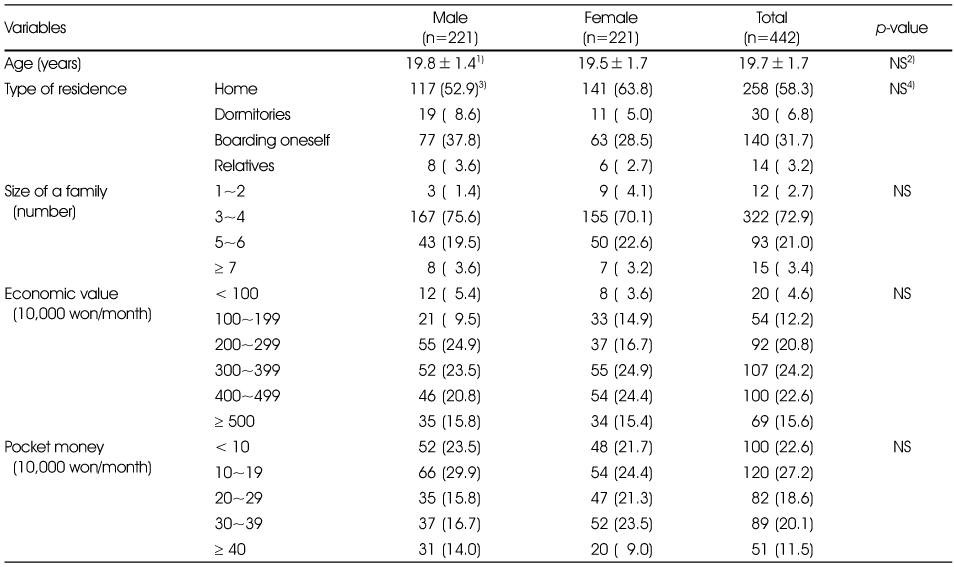

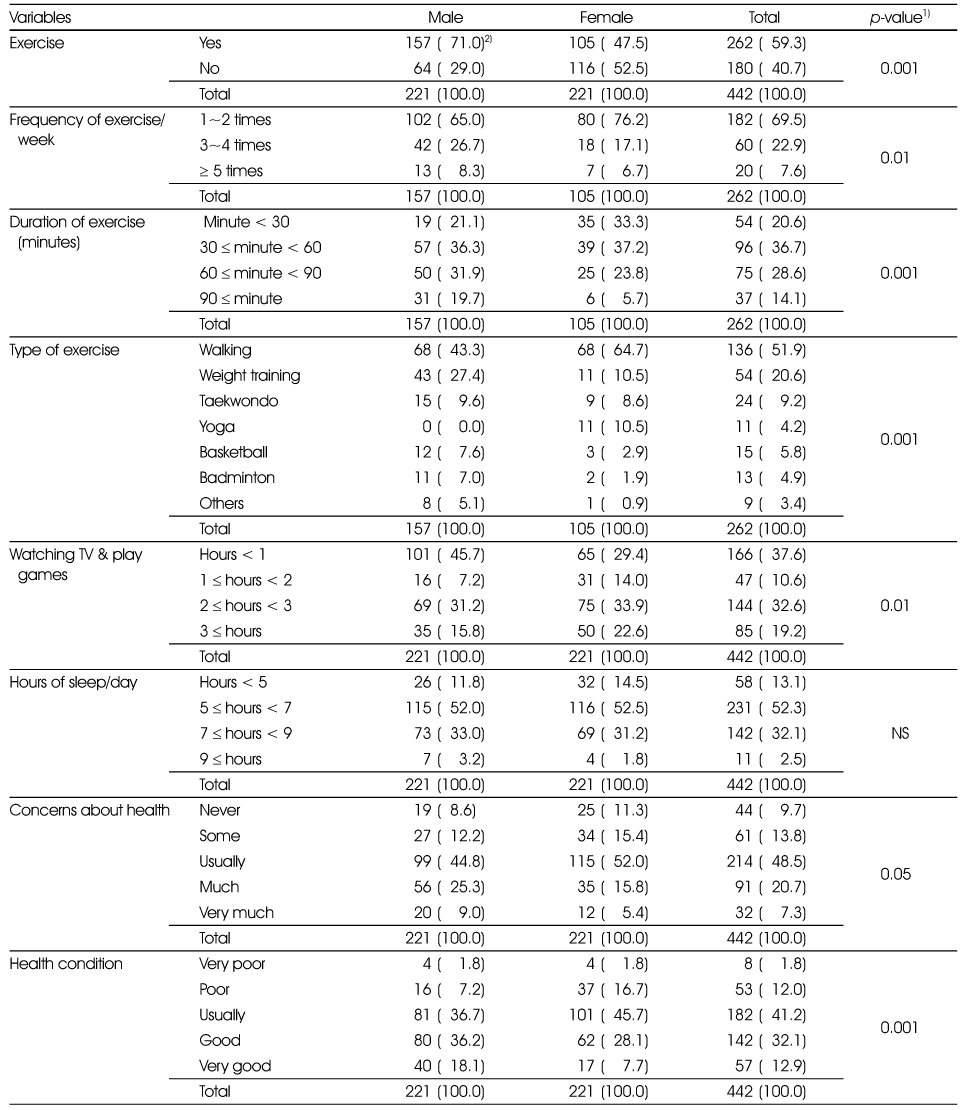
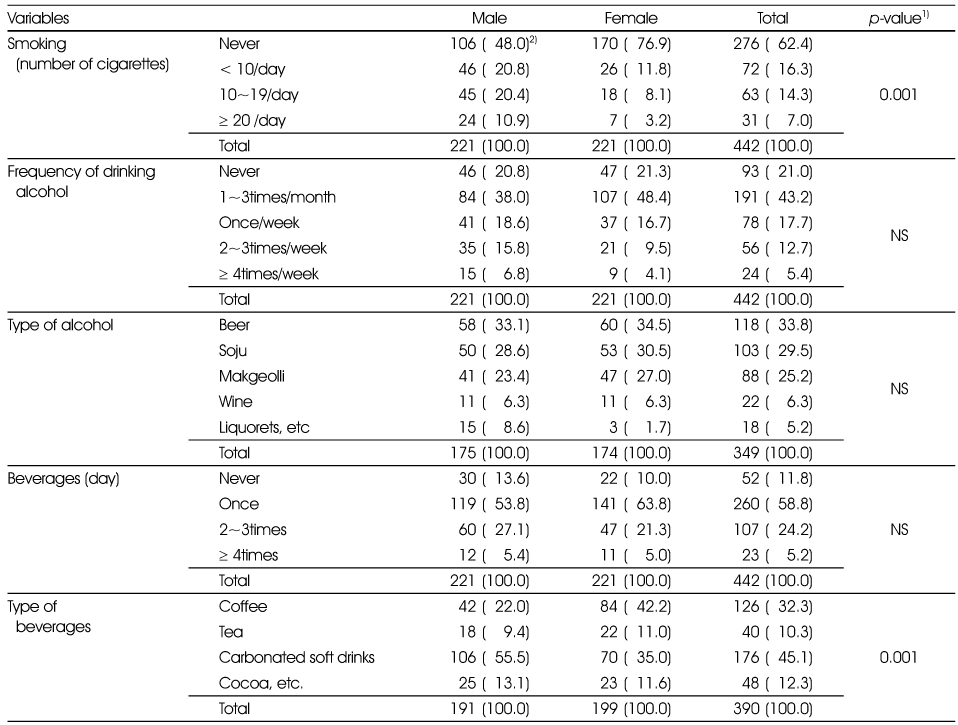
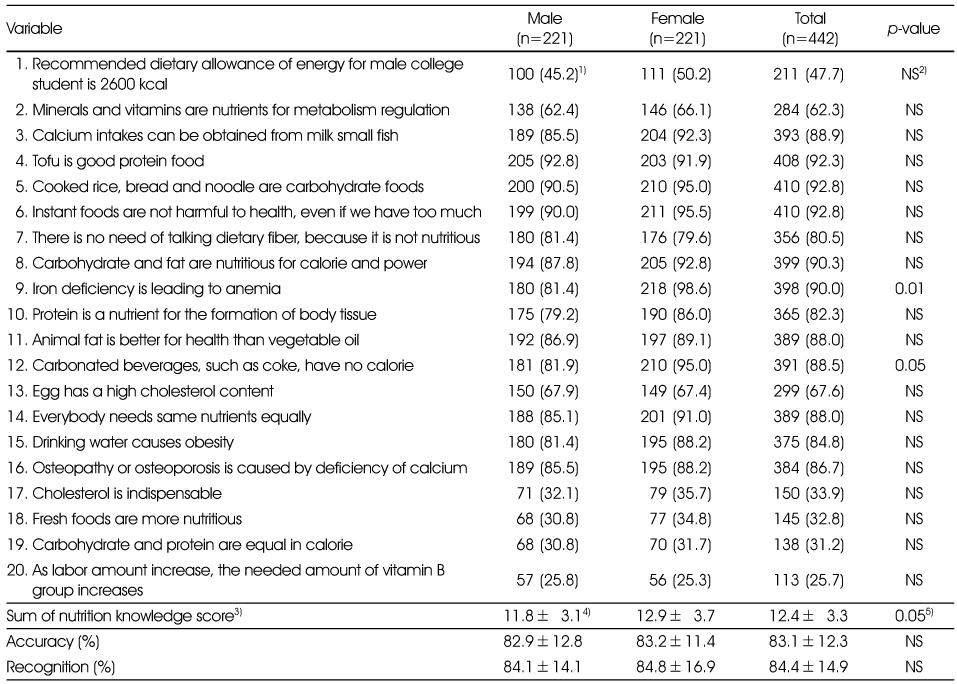
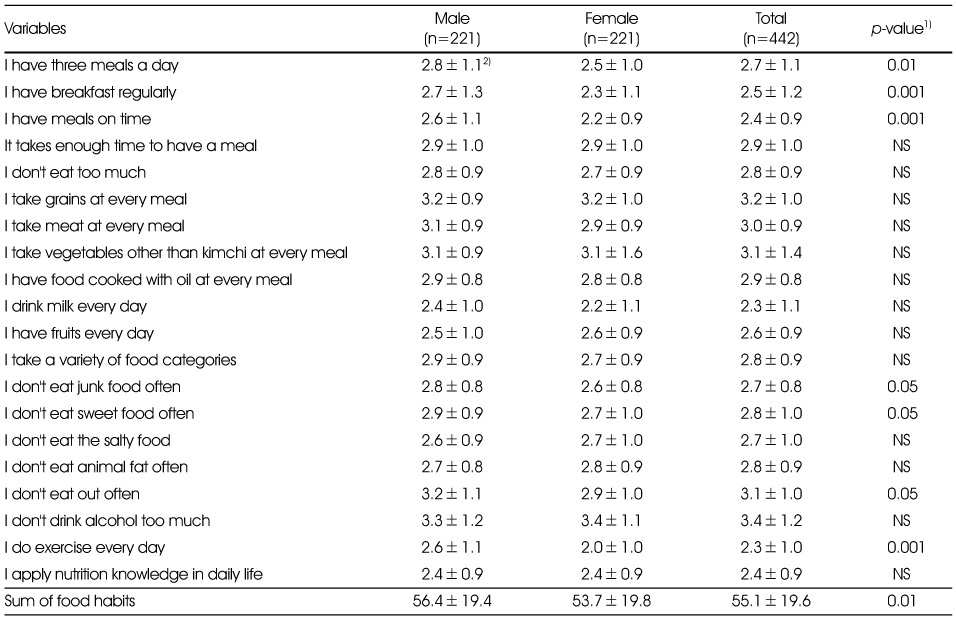
 Cite
Cite


